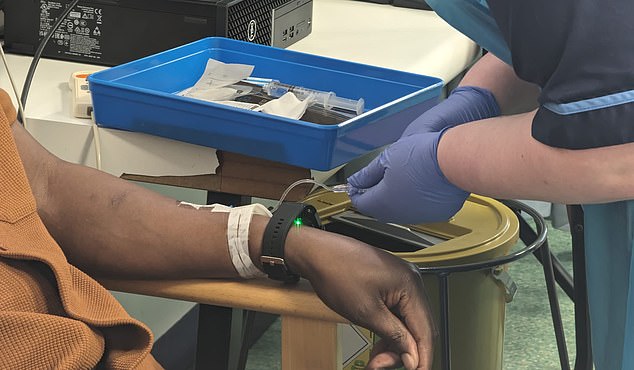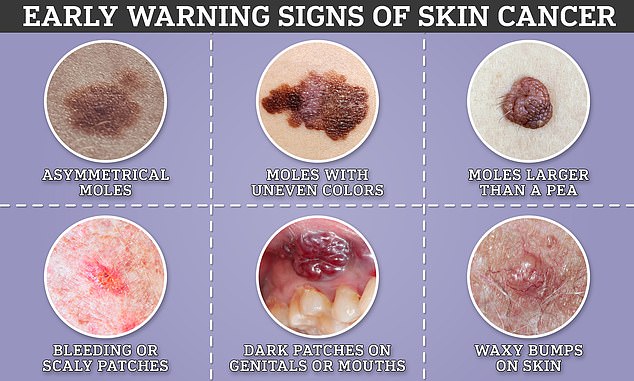- READ MORE: NHS employing cattle hides to mend facial injuries from skin cancer
- LISTEN: Trump, Zelensky, the emergence of Europe’s Far Right, and what lies ahead for NATO – tune into Alas Vine & Hitchens on your preferred podcast platform.
Patients suffering from the most severe form of skin disease cancer will receive expedited access to a 'game-changing' cancer vaccine on the NHS .
The needle-free shot, administered for as long as two years, is specifically designed for individuals to prevent their melanoma from coming back. — which experts think will mark the beginning of a new phase in combating the illness.
It works by enhancing the immune system’s reaction assisting it to 'target' cancer cells to stop their recurrence.
This represents an extension of NHS England's cancer vaccine initiative, which has enabled numerous patients to be administered with a bowel cancer vaccine over the past year as part of their pilot program.
The healthcare service aims to offer tailored cancer treatments to as many as 10,000 individuals in England by the year 2030 via this initiative.
Prime Minister Sir Keir Starmer Today stated that the action was 'hardly less than lifesaving,' and mentioned that additional groundbreaking research advancements would shortly follow.
Referred to as iSCIB1+ (Immunobody), this method employs a strongly pressurized jet of liquid to deliver the vaccine directly into the skin or muscle tissue.
It zeroes in on proteins exclusive to melanoma tumors, alerting the immune system. The immune response subsequently identifies, assaults, and eliminates these cancerous cells.

At present, approximately fifty percent of individuals diagnosed with melanoma, which ranks as the fifth most prevalent type of cancer in the UK, show positive responses to immunotherapy treatments.
However, those individuals who don't may face an increased likelihood of their cancer progressing.
There is hope that the vaccine trial, created in collaboration with UK life sciences firm Scancell, will enhance the body’s reaction to this therapy.
Patients with advanced melanoma must undergo a blood test to identify their tissue type prior to participating in the trial.
Professor Peter Johnson, the NHS National clinical director for cancer, stated: "Skin cancer can have a profound effect."
We understand that cancer vaccines hold the promise to transform cancer treatment for patients in this nation and globally — ultimately saving more lives.
He stated: "Individuals facing advanced stages of cancer don't have much time to waste, which is precisely why a system capable of swiftly pinpointing the appropriate trials for them holds such significance."
'By facilitating quicker access to clinical trials for more patients throughout England, we can establish an evidence foundation that drives advancements capable of halting cancer progression, benefiting not just those under the NHS but people globally as well.'

Sir Keir also mentioned that he was implementing measures to expedite clinical trials and streamline bureaucracy for researchers.
He stated: "Such innovations are essentially lifesaving, and I aim to witness an increase in these globally leading therapies being created in the UK."
Paul Thomas, aged 63, received an advanced skin cancer diagnosis in 2017.
After undergoing treatment, the illness came back; however, since participating in the SCOPE skin cancer vaccine trial earlier this year, his outlook has become more positive.
Thomas, who has four grandchildren and hails from Hampshire, stated: "I am incredibly fortunate to have been included in the trial."
Fortunately, I was still reasonably fit, and ever since starting the treatment, my tumors have decreased in size. Each time I get scanned, they appear smaller, which is truly thrilling.
I truly hope to completely eliminate my cancer rather than just achieve remission, and I remain hopeful.
Approximately 15,000 British individuals and 100,000 American citizens receive a diagnosis of melanoma annually. This condition ranks as the fifth most prevalent form of cancer in the United Kingdom.

The previous month, comedian Katherine Ryan announced that she had been diagnosed with skin cancer for the second time.
In her podcast and through social media, the renowned Canadian artist announced that she recently underwent surgery to remove a cancerous mole from her arm and will be undergoing an additional treatment to make sure it is completely eradicated.
She mentioned that a doctor first ignored her worries, yet subsequent tests revealed the spot was 'early-stage melanoma.'
The rate of occurrence in Britain has increased more rapidly than that of any other prevalent cancer.
Greater exposure to ultraviolet rays from the sun or tanning beds has been cited as the reason for this rise.
The illness develops when the DNA within skin cells gets harmed, leading to mutations that turn into cancer.
Even though significant progress in treatments has led to a rise in survival rates from below 50 percent to over 90 percent within the last ten years, it still claims the lives of more than 2,000 individuals annually.
Melanoma usually grows rapidly and may swiftly penetrate through the skin and into the underlying blood vessels.
As soon as the cancer cells enter the circulatory system, the illness has the potential to disseminate across the entire body.
Read more